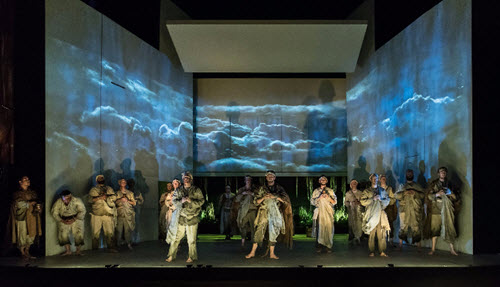 Ireland Delius: Koanga, Wexford Festival Orchestra and Chorus, Stephen Barlow (conductor), National Opera House, Wexford, 27.10.2015 (JMI)
Ireland Delius: Koanga, Wexford Festival Orchestra and Chorus, Stephen Barlow (conductor), National Opera House, Wexford, 27.10.2015 (JMI)

New Production
Direction: Michael Gieleta
Sets: James Mac Namara
Costumes: Sarah Roberts
Lighting: Ian Sommerville
Videos: Sean O’Riordan
Cast:
Koanga: Norman Garrett
Palmyra: Nozuko Teto
Simon Pérez: Jeff Gwaltney
Martínez: Christopher Robertson
Clotilda: Kate Allen
Uncle Joe and Rangwan: Aubrey Allicock
Always of special interest to the opera lover, the Wexford Festival Opera is well known for staging little-known works by composers who were once important, although some have now fallen into oblivion. This year the festival presents three true rarities: Koanga by Frederick Delius, Guglielmo Ratcliff by Pietro Mascagni, and Le Pré aux Clercs by Ferdinand Hérold. One of the things that stands out about this organization is the important presence of volunteers who assist the Friends of the Festival, sometimes usher, and even look after the wardrobe.
I was extremely pleased with my time in this pleasant town. If some of my readers are encouraged to attend (and I highly recommend it), next year’s program will include Herculanum (David), Vanessa (Barber), and Maria de Rudenz (Donizetti).
Koanga is the third of seven operas composed by Frederick Delius. It deals with the theme of slavery in the American South, which Delius knew from living there as a young man. He wrote it in 1897 and struggled to have it performed. The first complete staging was in Germany in 1904; it did not come to Britain until 1935, after Delius had died, and due to the personal commitment of Sir Thomas Beecham. In 1972 the libretto was revised, and that is the version offered here. The opera is interesting with some compelling moments throughout, among them the Epilogue which is poetic and moving. Perhaps it falls somewhat short on inspiration, and the importance of Voodoo in the plot does not exactly help to make it more engaging.
Koanga is an African prince, kidnapped by slave traders and sold to the plantation of Don Jose Martinez. His rebellious nature leads him to reject the work assigned to him, and Martinez offers to make him the companion of Palmyra, his wife’s maid. They fall in love right away, which arouses the anger of the foreman, Simon Perez, who wants to marry Palmyra but is constantly rejected by her. During the preparations for the wedding, a fight between Martinez and Koanga causes the latter and some fellow slaves to flee, and Koanga casts a curse upon the plantation. Concerned about Palmyra, Koanga returns to the plantation, kills the foreman, is arrested by Martinez’s guards, and is executed. Palmyra then renounces her Christian beliefs and kills herself, hoping to join her beloved in a better world.
Wexford Festival Opera commissioned a new production by Michael Gieleta, who has created a simple, attractive, and powerful work. The stage is a sort of white box closed by walls, the movements of which ingeniously accommodate the development of the action. The light-colored costumes are rather timeless, the lighting is effective, and there is a remarkable complement of videos projected on the walls. The story is well-narrated, with solid stage direction.
The musical direction was in the hands of Stephen Barlow, who managed to hold the audience with a compelling reading of the score. There was a fine performance from the Festival Orchestra, particularly in the brass section. The Festival Chorus, which is composed, almost without exception, of young people, did very well.
Koanga, the protagonist, was played by American baritone Norman Garrett. He was convincing, and well-suited to the character, although he had some problems in the first act.
The best of performance in the cast came from South African soprano Nozuko Teto in the character of Palmyra. Her voice has quality and is handled well, and she is remarkable on stage. She could have a bright future in the purely lyrical repertoire.
American tenor Jeff Gwaltney was a strong Simon Perez, but he almost sounded more baritone than tenor. Christopher Robertson was tight at the top, but overall did fine as Martinez. A good impression was left by American bass-baritone Aubrey Allicock, doubling as Uncle Joe and Rangwan, who offered a sonorous voice.
Jose M. Irurzun